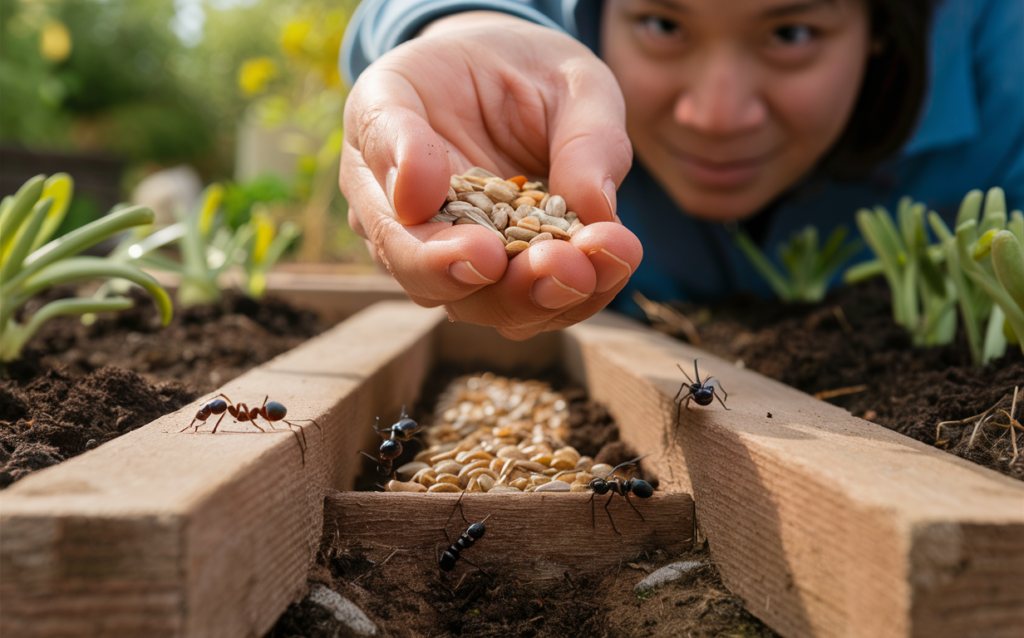Will the Ants in Raised Garden Bed Eat My Seeds? This is a common worry for many gardeners. Ants are tiny but hardworking creatures, and they are often seen crawling around in the soil. But do they harm your seeds, or are they just harmless visitors?
Ants in raised garden beds might not always eat your seeds, but they can sometimes cause problems. Some ants are attracted to the sweet coating on seeds or even the food you mix in the soil. However, not all ants are bad for your garden. In fact, they can help aerate the soil and even act as pollinators. Let’s explore more about ants and how to manage them in your raised garden bed.
Why Are Ants Attracted to Raised Garden Beds
Ants are often attracted to raised garden beds for a few reasons. They love the warmth of the soil and find plenty of food sources there. In some cases, they might be searching for seeds or other organic material. They may also find shelter in the cracks of the soil, where they can build their nests.
The raised garden bed creates an ideal environment for ants to thrive because of its rich soil and easy access to food. Ants can also help break down organic matter, making the soil healthier. However, this doesn’t mean they won’t disturb your seeds. Sometimes, they can be more focused on the food around the seeds than the seeds themselves.
Do Ants Really Eat Garden Seeds

Ants in raised garden beds don’t always eat seeds, but they can cause trouble. Some ants, like harvester ants, are known to gather seeds to take back to their nests. This could leave your seeds in danger, especially if you have a large ant population.
However, not all ants are interested in your seeds. Some might simply be attracted to the moisture or the sweet coating on the seeds. If you notice that ants are constantly gathering around your seeds, it might be a sign that they are causing problems.
How Ants Can Help or Harm Your Garden
Ants in raised garden beds can be both good and bad for your plants. On the positive side, ants help aerate the soil and keep it healthy by breaking down organic matter. This can improve the overall condition of your garden.
On the other hand, ants can be harmful if they disturb your seeds. In some cases, they might even carry seeds away from your garden. If ants are actively interfering with your seeds, it’s important to manage them carefully.
How to Protect Your Seeds from Ants in Raised Beds

If you want to protect your seeds, there are a few simple steps you can take.
Use natural repellents: Ingredients like cinnamon, lemon, or vinegar can help deter ants.
Create barriers: You can place a fine mesh or other protective barriers around your seeds to keep ants away.
Maintain soil health: Keep your soil balanced and healthy so ants are less attracted to it.
By using these methods, you can reduce the chances of ants eating your seeds while still allowing the beneficial ants to help with other tasks in your garden.
Conclusion
In conclusion, ants in raised garden beds may or may not eat your seeds. While some ants are interested in seeds, many are harmless and can even help your garden grow. It’s important to observe the behavior of the ants and take steps to protect your seeds if needed.
To keep ants away from your seeds, you can use natural methods like repellents and barriers. By being proactive and understanding the role of ants in your garden, you can find a balance that benefits both your plants and the ants.
FAQs
Q: In a raised garden bed, will the ants consume my seeds
A: Ants may sometimes eat your seeds, especially if they are attracted to the sweet coating or moisture. However, not all ants will do this.
Q: How can I keep ants from eating my garden seeds
A: Use natural repellents like cinnamon, vinegar, or lemon. You can also create barriers to protect your seeds.
Q: Are all ants bad for my garden
A: Not all ants are bad. Some ants help by aerating the soil and breaking down organic matter. They can also act as pollinators.
Q: What should I do if ants are damaging my seeds
A: If ants are damaging your seeds, try using natural repellents, barriers, or adjusting the moisture level in the soil.
Q: Do ants help or harm plants in raised garden beds
A: Ants can both help and harm plants. They help by improving soil health but can be harmful if they damage seeds or protect harmful pests like aphids.

